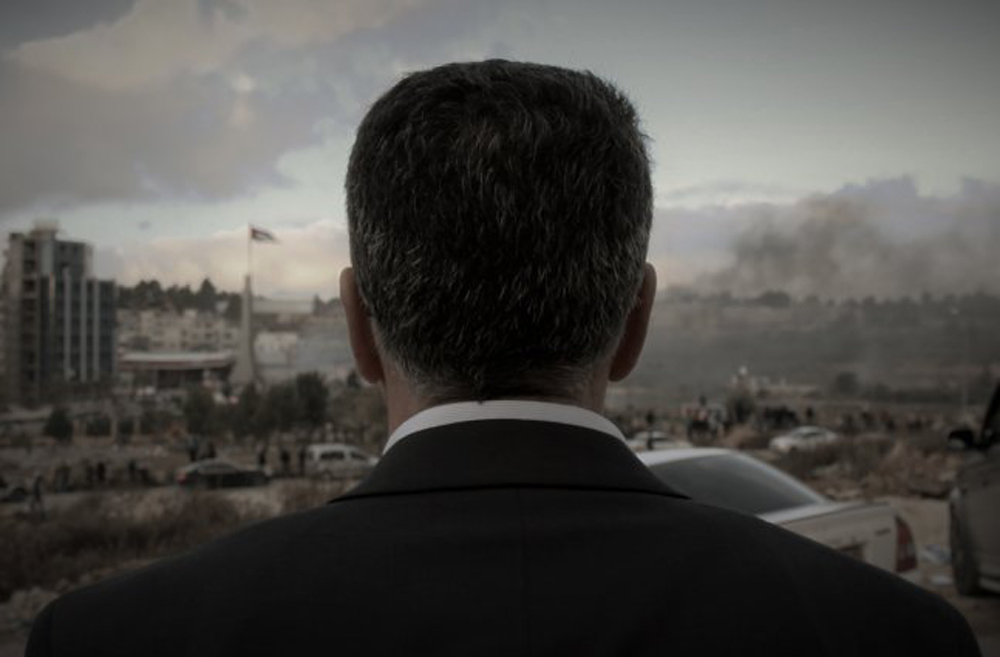“Let me explain how the tree lighting will go,” says Musa Hadid, the mayor of Ramallah in a meeting with his city council, describing his grand plans for Christmas Celebration in front of City Hall, complete with a flash mob to emerge in the piazza, fireworks to go off at the end of the night and Santa climbing down a wall with presents, leading one of the officials question the wisdom of having Santa fly through the air on his sleigh to get to the top of a building, mentioning that in this occupied territory of Palestine, “A zeppelin has a whole other image in people’s minds.”
Hadid has big ideas for the capital of Palestine, ones that go far beyond the holidays with a complete rebrand of the city, but the question in David Osit’s fantastic new film quickly becomes how does a place forge an identity for itself when it is an occupied territory that is inherently unstable. The presence of Israel looms large on the mind of Hadid and everyone living in Ramallah, who can wake up in the morning to see soldiers just over the border, if not in the city itself, and rely on them for basic resources such as clean water, but the American filmmaker leans on his candid, charismatic subject for a disarming look at how the mayor attempts to instill a sense of civic pride in the community when he himself can’t be entirely assured that his plans will come to fruition. Playing out at first like a lost season of “Veep,” “Mayor” sees Hadid in inane closed door meetings with staff about PR efforts to come up with a unifying slogan for the city – like any true modern municipality, the benign “WeRamallah” wins the day – and makes official visits to schools and various physical areas of concern, with sewage floods a continual issue when the city hasn’t received permission from Israel to build its own waste treatment plant.
Hadid’s frustrations generally can be seen in a lighthearted way when he’ll end a day by vaping to blow off steam, but just five days into filming “Mayor,” the Trump Administration announced it was moving the U.S. Embassy to Jerusalem, inflaming tensions in the region as Palestinian President Mahmoud Abbas denounced the decision and Ramallah is literally caught in the crossfire. Keeping in the spirit of the film, Hadid has to ask his assistant to install a radio in office to keep track of the news since he largely cuts himself off from media, though the 300 shekels it’ll cost to bring in a receiver, like everything else in the mayor’s life seems just slightly out of reach, but soon enough he’s confronted directly with the threat of Israeli incursion as their national army is emboldened to invade.
Although “Mayor” culminates in an intense physical stand-off, it has built up immense soft power well before then with Hadid as a deeply sympathetic character not because of the truly unique situation he finds himself in having to contend with centuries-old strife when simply trying to conduct the daily business of a city that’s an international flashpoint, but of how universal the film becomes as a profile of someone doing the best with what resources they have and forging ahead even when they know their best is likely not to be good enough to effect significant change, given all the various parties that need to be satisfied. Remarkably, however, “Mayor” seems bound to pull that feat off with audiences of all different backgrounds, particularly in how Osit is able to locate emotionally specific moments of shared cultural experience both in the footage and in his fiendishly clever use of music, which gives Hadid an Ennio Morricone-esque entrance as if he were a sheriff bringing peace to a small town in a Sergio Leone spaghetti western and consistently contrasts the reality of the situation with the vision of what could be through brilliant sound cues. Capturing either end as vividly as “Mayor” does is impressive enough, but in revealing both the dream of Ramallah and a side of Palestine that’s rarely seen outside of the region, it proves to be a revelation.
“Mayor” will screen at True/False on March 7th at the Missouri Theatre and March 8th at 5:30 pm at Gannett Hall.




